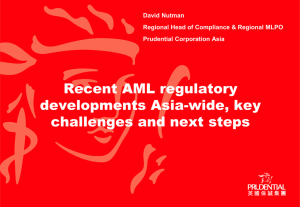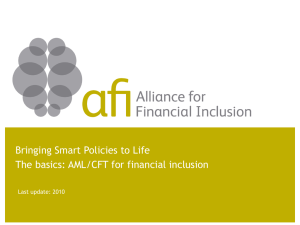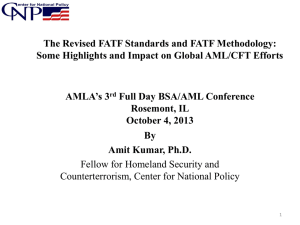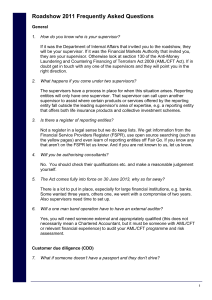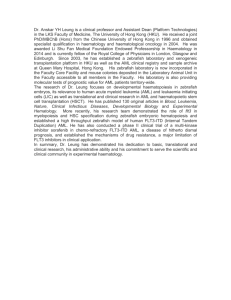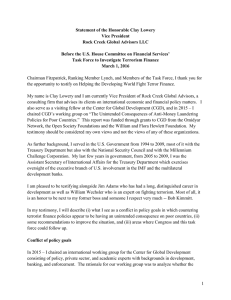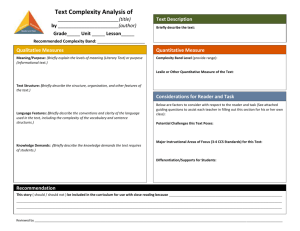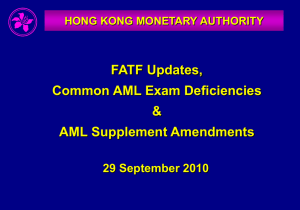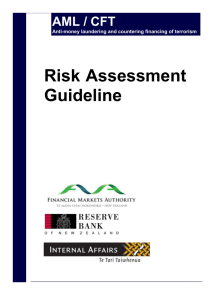Anti-money laundering and counter terrorist financing
advertisement
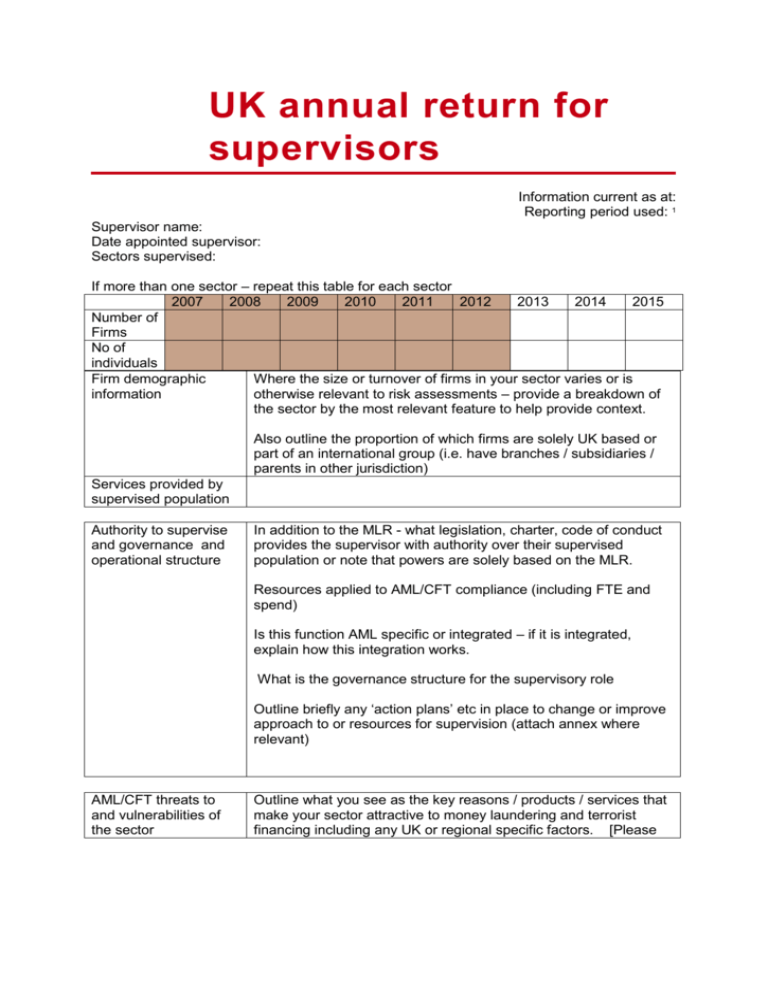
UK annual return for supervisors Information current as at: Reporting period used: 1 Supervisor name: Date appointed supervisor: Sectors supervised: If more than one sector – repeat this table for each sector 2007 2008 2009 2010 2011 2012 2013 2014 2015 Number of Firms No of individuals Firm demographic Where the size or turnover of firms in your sector varies or is information otherwise relevant to risk assessments – provide a breakdown of the sector by the most relevant feature to help provide context. Also outline the proportion of which firms are solely UK based or part of an international group (i.e. have branches / subsidiaries / parents in other jurisdiction) Services provided by supervised population Authority to supervise and governance and operational structure In addition to the MLR - what legislation, charter, code of conduct provides the supervisor with authority over their supervised population or note that powers are solely based on the MLR. Resources applied to AML/CFT compliance (including FTE and spend) Is this function AML specific or integrated – if it is integrated, explain how this integration works. What is the governance structure for the supervisory role Outline briefly any ‘action plans’ etc in place to change or improve approach to or resources for supervision (attach annex where relevant) AML/CFT threats to and vulnerabilities of the sector Outline what you see as the key reasons / products / services that make your sector attractive to money laundering and terrorist financing including any UK or regional specific factors. [Please also note any nuclear proliferation financing threats or vulnerabilities] Outline any aspects of your sector that you consider to be low risk. If risks vary across your sector – outline the key variables. Outline how you identify and maintain your understanding of these threats and vulnerabilities Outline how you record and update this assessment and how it informs your supervision approach. Annex your risk assessment Registration / membership / approval process Outline the requirements for registration / membership / approval Outline what checks are undertaken to prevent criminals from gaining membership, management control or ownership (beneficial or legal) Outline the grounds and processes by registration / membership / approval can be revoked Are there any limits on your ability to undertake checks or to refuse or revoke registration / membership or approval Where relevant – outline how you prevent the registration of shell banks 2007 2008 2009 2010 2011 2012 2013 2014 2015 Number refused in total Number refused for AML/CFT reasons* * Annex case studies or brief descriptions (can be anonymous) for each case or class of cases Powers to monitor Outline all your powers to monitor your supervised population, including reference to the law, code, or other provision. Include reference to annual returns / registration process; desk based reviews; general monitoring visits; investigations; powers to demand documents; powers to demand entry; what you can do if the person refuses. Applying a risk based approach to use of these powers If you have a risk scoring process by which you determine which firms you will monitor – please explain it briefly here and annex the relevant documents. Outline the factors that you take into account in determining how you set your monitoring programme each year. Outline any other threats and vulnerabilities that you monitor for non AML/CFT reasons that you see as relevant indicators of potential vulnerability for either poor compliance or criminal corruptibility which are taken into account in determining your general monitoring approach. Outline the triggers or process by which a firm not on the monitoring programme could be included on the programme during the year or could be subject to an investigation. Outline how you monitor and deal with repeat failings on the same issue or on different AML/CFT issues. Practical delivery of monitoring Briefly outline what is included in an annual return / registration renewal and annex relevant documents Briefly outline how you conduct a desk based review and the issues covered and annex relevant documents Briefly outline how you conduct a monitoring visit and the issues covered Briefly outline how you conduct an investigation If you have any other monitoring techniques – such as a thematic review – Briefly outline how you conduct those. Where relevant – outline how you monitor group compliance. Powers to improve compliance and enforce Outline all the actions you can take to deal with poor or noncompliance up to and including criminal prosecution and/or referrals for prosecution. Include reference to the law, code or other provision where relevant. (see final page for list of categories so that we can be using comparable terminology) Outline the basis on which you would make a SAR against a member of your supervised population or other person. Briefly outline your enforcement strategy (either general or AML/CFT specific) and annex the relevant document (this should be publicly available to your members) Briefly outline how you ensure that your action is proportionate and takes into account your supervised population’s discretion under the risk based approach. Briefly outline how you follow up after taking action to ensure that compliance has improved. How do you rate compliance (Is this something we could get cross AMLSF What do you consider non-compliance? What do you consider general compliance? agreement on so we just add it into our terminology?) What do you consider compliance? Note – if you have multiple sectors – please do one table per sector 2007 2008 2009 2010 2011 2012 No of annual returns# % of annual returns which prompted monitoring ## No of DBR ~ C GC NC No of visits C GC NC Add in any other methods you use to monitor No of investigations No action Direct disciplinary action Referral to committee/ tribunal for disciplinary action No of SARs No of police referrals (other than a SAR) No of criminal convictions (that you know of)* No expelled / deregistered* No of interventions* No of suspension* No of fines* No of reprimands* No of conditions or undertakings* No of action plans No of warnings 2013 2014 2015 # If you do annual returns for general supervision, rather than just AML, please can you give total numbers and indicate that it is for all. If you only do annual returns for AML – please indicate this. ## If you do annual returns for general supervision, can you indicate % in total which would prompt closer monitoring for any supervisory reason and separately for AML supervision (if possible) and indicate clearly which percentage relates to which. ~ For desk based reviews, visits and investigations – please include the total number which have any AML/CFT angle *Annex brief case studies or link to the published outcomes for each case Promoting compliance Outline the methods you used during this reporting period to communicate obligations and provide assistance on compliance to your supervised population. For each item – annex or provide link to the communication or the schedule of events; outline the frequency with which it is provided, the channels used for communication, the potential audience and where monitored – the actual uptake. Do you have a section of your supervised population that are either disengaged or hard to engage? What strategies are you using to reach them? Measuring improvement Outline the main areas of non-compliance identified in the current reporting period and how you are seeking to address these. Outline the key areas of improvement identified in the current reporting period. Outline the key areas of good practice identified in the current reporting period. Outline any trends seen as a result of enforcement or education actions you have taken in this reporting period. Note - if you have case studies or reports – annex these Working in partnership Outline your engagement/ joint working in this reporting period with any other domestic AML/CFT supervisor. Outline your engagement / joint working in this reporting period with any foreign AML/CFT supervisor. Outline your engagement / joint working in this reporting period with the UK FIU (the NCA) Outline your engagement / joint working in this reporting period with any foreign FIUs Outline your engagement /joint working in this reporting period with domestic law enforcement Outline your engagement / joint working in this reporting period with any foreign law enforcement If you have had no engagement with one or more of the above – why is this? Any other information Taking into account the FATF effectiveness methodology – especially Immediate Outcome 3, is there anything else that you want to tell HMT or FATF about? Self-assessment In five sentences or less, explain: Why you deserve a rating of largely effective OR What you are doing to improve your performance so that you can achieve a rating of largely effective List your annexes or links Terminology Expulsion: means any power to remove membership, authorisation, fit and proper status, and/or registration. Intervention: means any power to take over the running of a business Suspension: means any power to suspend membership, authorisation, fit and proper status and/or registration Fine: means any power to levy a financial penalty Reprimand: means any type of formal written warning issued by a tribunal / committee / or organisation and which may be published Undertaking or condition: means any formal and publishable requirement to implement remediation or restriction on ability to carry on business or offer specific services Action plan: Any communication seeking improvements which is considered as part of the general capacity development and monitoring programme, rather than part of a formal disciplinary programme. Warning: Any communication with a firm cautioning against specific conduct.

